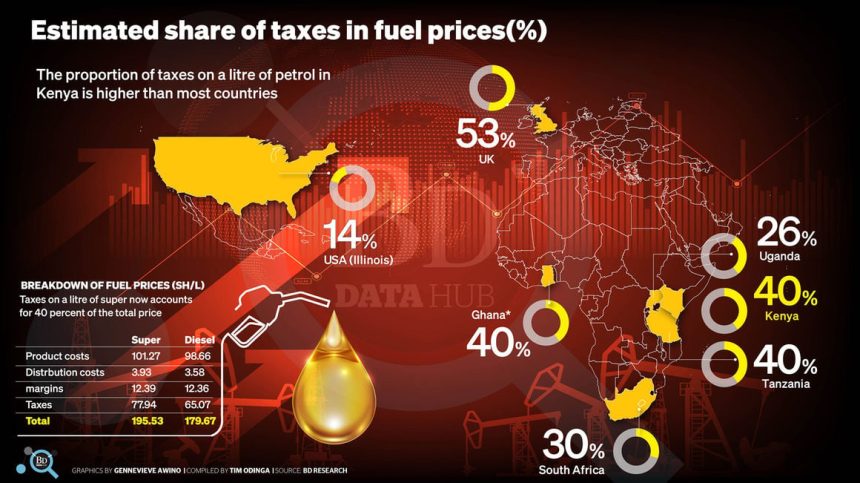Kenya has joined the league of countries collecting the highest taxes on fuel, calculated as a percentage of the final price, overtaking bigger economies such as the US and South Africa.
An analysis by the Business Daily shows that taxes in Kenya now account for 40 percent of the cost of every litre of super petrol and diesel, compared to 14 percent in Illinois State— the state with the highest fuel taxation in the US— and South Africa at 30 percent. Ethiopia does not tax fuel.
Though Tanzania has the cheapest fuel in the region, the ratio of taxes as a percentage of the pump price ties with Kenya at 40 percent.
Kenya charges seven levies and two taxes on fuel and last week doubled Value Added Tax (VAT) on the commodity to 16 percent, further increasing the taxation component for every litre of super petrol, diesel and kerosene.
A litre of super petrol and diesel jumped to Sh195.53 and Sh179.67 respectively in Nairobi in the wake of the imposition of the new VAT rate from the start of this month against the backdrop of public outrage over the heavy taxation of fuels.
President William Ruto defended the decision to double VAT despite it having triggered a fresh surge in the cost of living given that Kenya’s economy heavily relies on diesel.
“We are not overtaxing ourselves. But to balance it out, as we add eight percent on the same fuel, I have removed the Railway Development Levy (2.0 percent) and Import Declaration Fee (3.5 percent),” Dr Ruto said recently.
VAT is the biggest tax charged on fuel in Kenya followed by excise duty, the Road Maintenance levy and the Petroleum Development Levy at Sh5.40 per litre of super petrol and diesel. Others are Petroleum Regulatory Levy, the Anti-adulteration Levy, and the Merchant Shipping Levy.
The United Kingdom (UK) is one of the countries with the highest taxes on fuel in the world, with taxes accounting for 53 percent of the cost of every litre of gasoline.
Closer home, Kenya ties with Tanzania but ranks higher than Uganda whose taxation on fuel accounts for 26 percent of the cost of a litre of fuel.
Kenya has the costliest super petrol in the East African region in the wake of the VAT revision, ahead of Uganda, Rwanda and Tanzania.
A litre of super petrol in Uganda is currently retailing at $1.362 followed by $1.303 in Rwanda and $1.186 in Tanzania. A litre of super petrol in Kenya is now retailing at $1.38.
In South Africa, a litre of super petrol is retailing at $1.176 while in Ghana it is going for $1.154. Taxes and margins for oil dealers account for 40 percent of the cost per litre of fuel in Accra.
Diesel in Kenya will, however, be cheaper at $1.27 per litre compared to $1.361 in Uganda, and $1.282 in Rwanda. Diesel is cheapest in neighbouring Tanzania at $1.099 a litre.
Of the countries whose fuel prices were considered in the Business Daily analysis, the US is the only one that produces and refines fuel. Kenya, Rwanda and Uganda mainly rely on the Port of Mombasa for their fuel imports.
Experts have repeatedly warned of the heavy fuel taxes in Kenya, with most of the memoranda submitted to the parliamentary hearings on the Finance Bill, 2023 advising against increasing VAT.
But some of Kenya’s financing partners, notably the International Monetary Fund have been vocal in the push for high taxation on fuel.
Members of Parliament while adopting the push to double VAT said the decision was taken to cure disparity on how the tax is charged on various products.
“The effect of the differential VAT on fuel has led to oil marketing companies being in a constant credit position, thus leading to high tax expenditure for the Government,” the National Assembly Finance Committee said in its review of the Finance Bill, 2023. Parliament passed the Bill last month.
Parliament in 2021 declined to pass into law a recommendation by the Finance Committee that cut the then eight percent VAT on petroleum products to four percent, besides lowering the petroleum development levy (PDL) from Sh5.40 to Sh2.50 per litre.
Experts have in the past questioned the rationale of the government to subsidise pump prices instead of lowering the taxes that are the biggest drivers of the high fuel costs.
Heavy taxation has denied Kenyans the benefits of the current drop in global prices of crude. The commodity is currently retailing at $73.02 per barrel, from a high of $87.88 in January and is projected to drop further.
The sustained drop in global costs of crude would have handed consumers a huge reprieve following the removal of the fuel subsidy that had cushioned Kenyans from April 2021.




